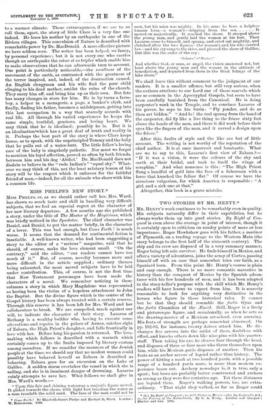MISS PHELPS'S NEW STORY.*
Miss PHELPS, or, as we should rather call her, Mrs. Ward, has shown so much taste and skill in handling very difficult subjects, that we feel an especial regret at the character of her new literary departure. A few months ago she published a story, under the title of The Master of the Magicians, which was briefly noticed in the Spectator. The chief character was Daniel, and Daniel, to put the matter briefly, in the character of a lover. This was bad enough, but Come Forth ! is much worse. It seems that the demand for sentimental fiction is insatiable. A well-known writer, who had been suggesting a story to the editor of a "serious" magazine, said that he should, of course, make the love element small. " On the contrary," said the editor, " our readers cannot have too much of it." But, of course, novelty becomes more and more difficult in the article supplied ; ordinary themes being exhausted, the most sacred subjects have to be laid under contribution. This, of course, is not the first time that New Testament personages have been made the characters of a novel. We remember noticing in these columns a story in which Mary Magdalene was represented as having been the victim of a hopeless attachment to John the Baptist. But the divine figure which is the centre of the Gospel history has been always treated with a certain reserve. Through this reserve it has been left for Mrs. Ward and her collaborateur to break. We are compelled, much against our will, to indicate the character of their story. Lazarus of Bethany is a wealthy builder who, having to execute some alterations and repairs in the palace of Annas, catches sight of Zahara, the High Priest's daughter, and falls frantically in love with her. Before long his passion is returned. The love- making which follows is described with a warmth which certainly comes up to the limits imposed by literary custom among ourselves. If we consider the manners of the Jewish people at the time, we should say that no modest woman could possibly have behaved herself as Zahara is described as behaving. Zahara goes for an excursion on the Lake of Galilee. A sudden storm overtakes the vessel in which she is sailing, and she is in imminent danger of drowning. Lazarus vainly attempts to save her. What follows we shall give in Mrs. Ward's words :- "Upon this fair and shining waterway a majestic figure moved. It glided towards the shore, with light feet treading the water as a man treadeth the solid sand. The face of the man could not be • Come Forth! By Elizabeth Stuart Phelps and Herbert D. Ward. London : W. Heinemann. 1890.
seen, but his mien was mighty. In his arms he bore a helpless
human form—a woman's—dripping from the sea It moved on majestically. It reached the shore. It stooped above the young man, and gently laid the woman at his feet. Then Lazarus came to himself, and sprang, and cried out mightily, and clutched after the two figures—the woman's and his who carried her—and his cry rang to the skies, and pierced the shore of Galilee. But this was the order of the cry : 'Zahara!'—`Master !
And whether God, or man, or angel, the vision answered not, but bent above the young man and the woman in the attitude of benediction, and departed from them in the thick foliage of the lake shore."
We shall leave this without comment to the judgment of our readers. It is a smaller offence, but still very serious, when the authors attribute to our Lord one of those marvels which are so common in the Apocryphal Gospels, but seem to have been carefully banished from the Canonical. He is doing carpenter's work in the Temple, and to convince Lazarus of his power, he says to his burin : " Fly yonder, and do as thou art bidden." " And lo ! the tool sprang from the hand of the carpenter, did fly like a live thing to the frieze sixty feet above the heads of the men, and there it did work before their eyes like the fingers of the man, and it carved a design upon the frieze."
After this, faults of style and the like are but of little account. The writing is not worthy of the reputation of the chief author. It is at once incorrect and bombastic. What are we to say to this, Lazarus's first view of Zahara ?- " If it was a vision, it wore the colours of the sky and earth at their bridal, and took to itself the wings of seraphim." And what nonsense is this : " The High Priest flung a handful of gold into the face of a fisherman with a force that knocked the fellow flat." Of course we have the atrocious vulgarism, for which America is responsible : " A girl, and a sick one at that."
Altogether, this book is a grave mistake.


















































 Previous page
Previous page